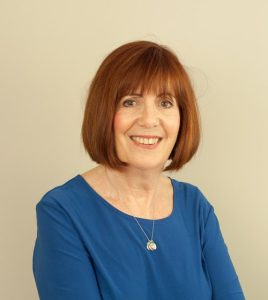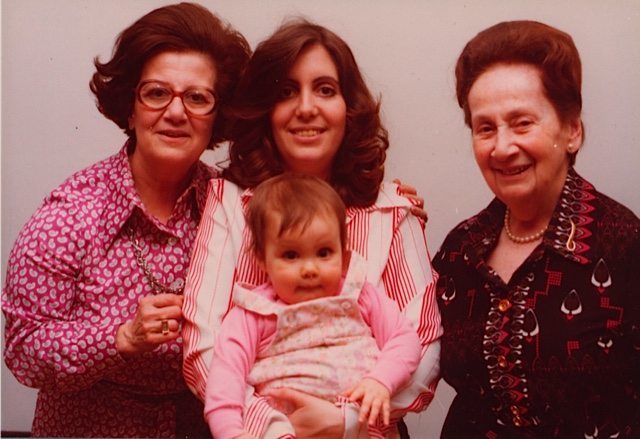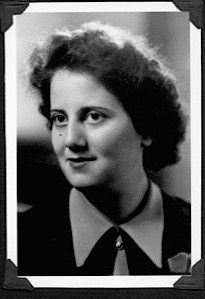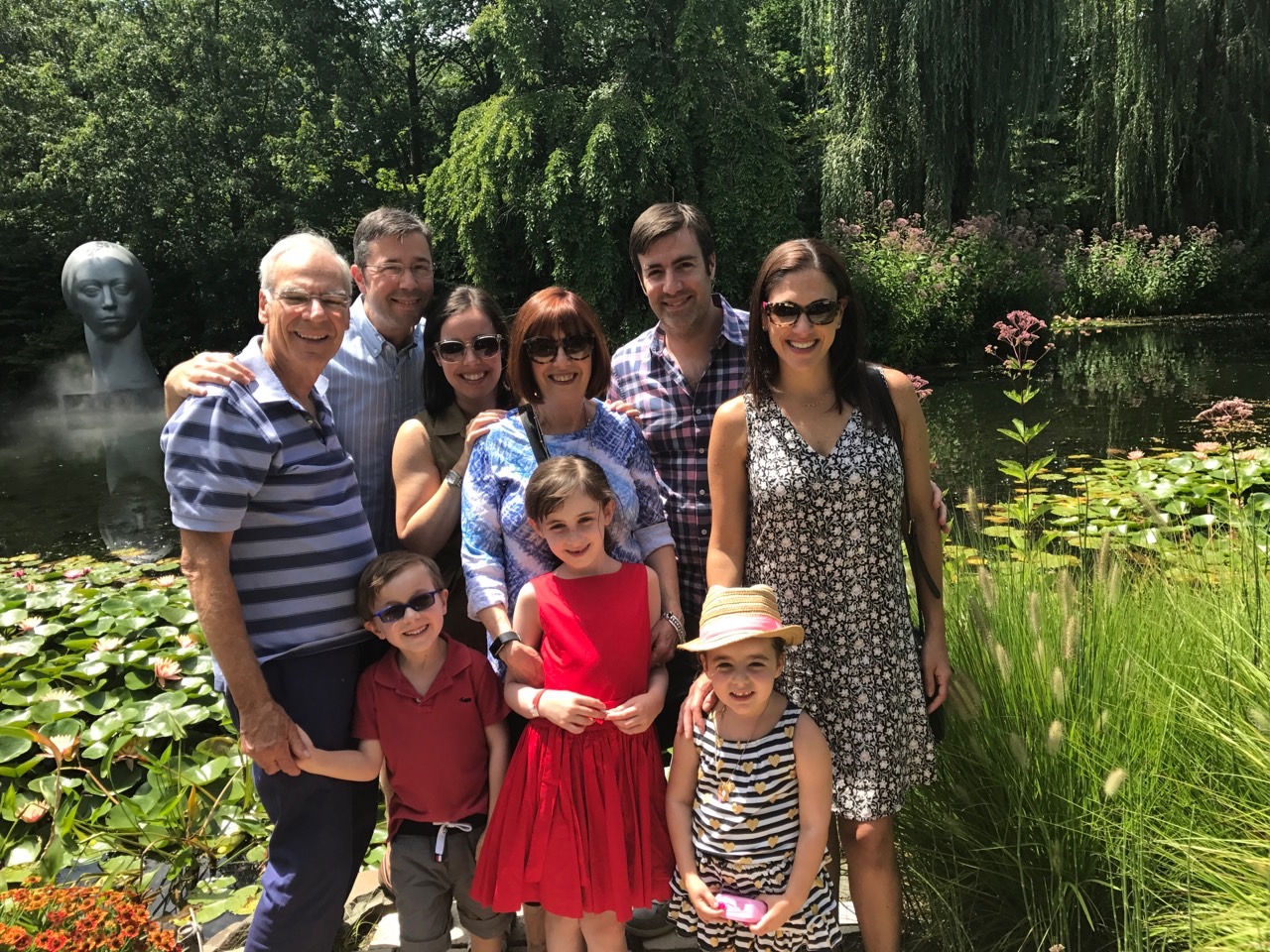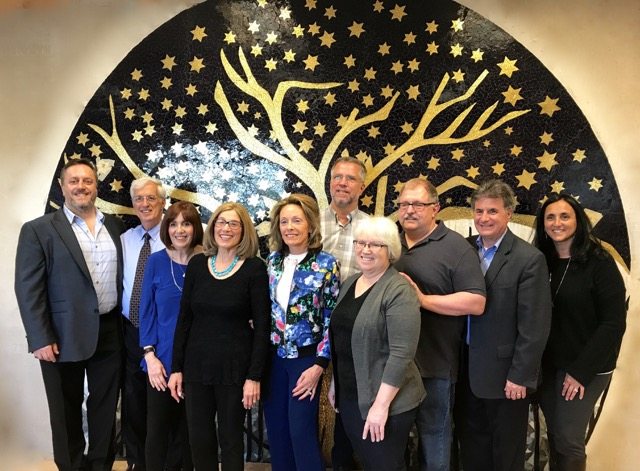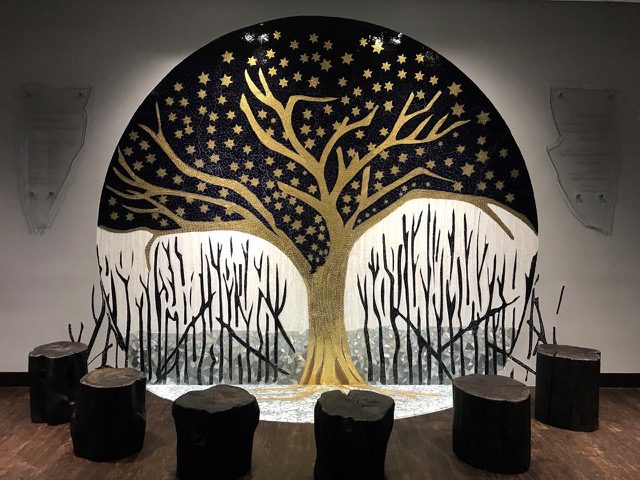SECOND GENERATION TESTIMONY BY EVELYN RAUCH
I never knew very much about the Holocaust growing up. I knew that my father and mother as well as my maternal grandmother had come to this country from Germany but I new almost nothing about how they got here or why. As a child growing up in New York City, I spent most of my time concentrating on school, friends and my ever-growing love for art. I did try at times as I got older to approach the subject of their past, but I usually reached a stone wall. They would say we are Americans now. The past is the past. They did not want to share their stories with me.
I think it was truly to protect me from knowing the horror of those years when they had to flee their homeland but it was unfortunate that I had to piece together their stories only after their deaths. You see I knew that something was different about my family. They were not like my friends’ mothers and fathers. My home never seemed to be as joyful and I had no cousins or siblings growing up. I was everything to my parents and when I didn’t measure up to their expectations of me I felt their deep disappointment. I was protected and deeply loved but to an extreme and it made me angry and confused. I never wanted to disappoint them and so I in turn did not share very much of my life with them.
My mother had a very unhappy life. Illness plagued her and my father’s lives. First when my father became ill at a young age and then her own health deteriorated. She finally ended her own life.
Only when I discovered a treasure-trove of papers and documents in my own top draw of my childhood bedroom did I finally understand what my family had endured. It was all in German but I knew that my mother had left me this gift, a key to open the door of understanding. What she couldn’t bare to tell me in life she left to me in death.
I spent the next seven years after her death researching out and documenting her and my grandmother’s story, with the help of my mother’s childhood friend, whom I only met after my mother’s passing. Eva Neisser was also a Holocaust survivor. Eva’s translations and insight resulted in my writing the book Surviving Steffi.
My grandmother and mother lived in Breslau, Germany, which is now Wroclaw, Poland. They had a happy life in Germany. Unfortunately, my grandfather, Ernest Lippmann died at a young age. My mother was only seven at the time. My grandmother needed to go to work, and so she took over her husband’s newly established insurance business. In order for her to get started her husband’s wealthier friends took out large insurance policies on their lives. This act of kindness assured the success of the business and gave my grandmother the will and fortitude to continue on her own. These friends continued to be close and support each other as the situation in Germany began to deteriorate with the rise of anti-Semitism.
My grandmother realized that Hitler and the Third Reich where becoming more and more powerful and so early on she began to make arrangements to get my mother and herself out of Germany. She had a distant cousin in America who she arranged to vouch for her and my mother. This was not an easy task because many American Jews were afraid that they would become the caretakers of these refugees, and so she had to convince Abraham Goldschmidt that the situation was life or certain death and that they would not be a burden. He did agree and actually helped my family financially in the early years in America.
She applied for visas for herself and her daughter to immigrate to America, but it was a cruel waiting game until their number would be called. Meanwhile my grandmother was desperate to get my mother Steffi out of Germany. She wrote letters to businesses in England to get my mother a job as a chambermaid. She was finally able to get a position in a boarding house outside of London. Shortly after Kristallnacht, the night of broken glass, my mother was sent to England accompanied by an aunt, not knowing if she would ever see her mother again.
My mother’s longing for her mother at the age of sixteen and a half is well documented in several letters that I found amongst the papers in my top draw. There is a poem I found in the pile of papers. It was in German and Eva Neisser translated it for me. It truly expresses how my mother must have felt at that time. I cannot be sure if she wrote this herself but it was at the core of her emotions her whole life.
Mother, home of my soul,
My heart longs for you
I wandered near and far,
But never found the peace of home.
Everyone only wants to know his own children,
But he does not want to know others.
I have not found anyone
Who understands me as you do.
Who loves me with all the faults
He finds in me.
When I erred and made mistakes
I was heartlessly ignored.
And felt that only a mother
Could be understanding.
Often during dark nights
I cried, not understanding.
I did not want to continue this life.
I longed for my mother, my mother always
And felt that my mother
Was the home of my soul.
I never understood the deep bond that my mother had with my grandmother that I was left out of. I resented it and was jealous of it at times. Now I understand that their deep bond resulted from their struggle together to survive. My grandmother saved them both and protected my mother all her life.
Eva Neisser told me a fantastic story of how my grandmother saved her family from death by the Nazis. She said that my grandmother had been very smart to start preparing for her exit from Germany early on but her friends who had big businesses and much to loose were unconvinced that they needed to leave, and by the time they realized what was happening, it was too late. Eva’s father had been dragged off to jail and they were left penniless. So my grandmother took a great chance by cashing in the insurance policies of her friends that had started her out in business years before as if they were dead. That money went to bribe the officials to get Eva’s father out of jail and to buy Eva’s family visas out of Germany. Eva told me she owed her life to my grandmother, and that if my grandmother had been caught, she most certainly would have been put to death. How brave she was. She just said one good turn deserves another.
My grandmother continued to wait in Germany until her number was finally called. She sewed all her valuables into a featherbed and put all her belongings into a storage container and sent it to Denmark Harbor where she thought it would be safe. Unfortunately, the harbor was bombed and she lost everything. She came to the US with ten dollars in her pocket. My grandmother lost her sister and her mother who she could not arrange safe passage for. They died in Germany.
My mother traveled in 1940 by convoy to America after spending two years in England. She was reunited with my grandmother, Kathe, in New York City and lived with the Neisser’s for several months. She met my father, Eugene Mannheimer at a party several months after her arrival in NYC and they were married soon thereafter, in 1946. My father came here from Mannheim, Germany after escaping with his brother Max from a German labor camp in 1936. His father died in Nazi Germany. His two sisters Rosel and Babette also survived and joined their brothers in New York City.
Ever since I learned the story of my parents past I have been trying in my own way to promote tolerance and understanding. I designed the memorial for the JCC in Bridgewater to honor all those who lost their lives and those that suffered at the hands of the Nazis. It has been the highest privilege to work on this project and I am humbled by the responsibility I have been given.
Editor’s Note:
Evelyn ends her memoir, Surviving Steffi, with the following poem to her mother:
Mother Keeper of my Soul
I shunned you when I should have embraced you.
You were so hard on me, so filled with expectations never met.
Your love too intense to be returned.
Now I long for your deep unwavering love.
I long for your tender touch.
Your comforting arms.
I need your guidance.
How lonely it is without a mother.
How empty I feel without your love.
How hollow the caverns of my mind.
How deep the sting in my heart.
Mother, I love you so!
